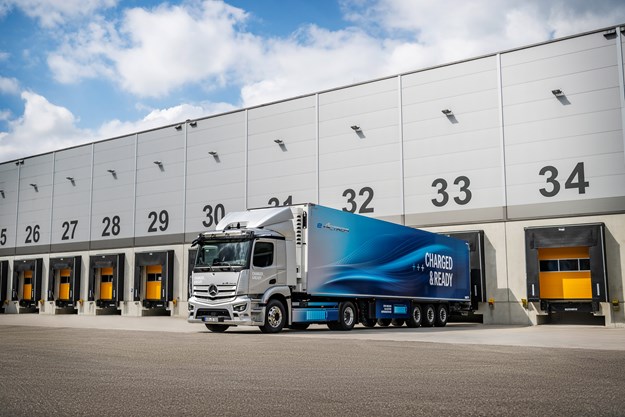
In a bid to prove its commitments to not only removing emissions from its trucks but also its supply chain more broadly, Mercedes-Benz plans to electrify delivery vehicles that service one of it factories in Worth Germany.
Mercedes-Benz Trucks says it is driving forward the transformation of the transport industry toward CO2-neutral drive systems and focusing on e-trucks also in its own supply chain. Mercedes-Benz Trucks has set itself the goal of 100 percent electrification of delivery traffic to its largest truck plant by the end of 2026.
Together with logistics service providers and the freight forwarders who supply the largest Mercedes-Benz Trucks plant daily, the company is working to increasingly integrate electrically powered trucks into their fleets.
Following the series-production launch of the Mercedes-Benz eActros in 2021 Mercedes-Benz Trucks says it is thus providing further proof of the practicality of e-trucks in the transport industry by meeting its diverse requirements. Plans include setting up a charging infrastructure in the Wörth plant, which will be available to both suppliers’ and the company's vehicles.
Several freight forwarders will be participating in the pilot phase, which is scheduled for implementation in 2023. In the coming year the first fully electric deliveries will be made to the Mercedes-Benz plant in Wörth among others those from its sister plants. In the pilot phase electrically powered Mercedes-Benz eActros 300 tractors will be utilized.
Later, the eActros LongHaul and other models will be added. Mercedes-Benz Trucks says it is thus demonstrating the wide range of applications of these two e-truck models under real-world conditions in the company's own transport logistics.
"Electromobility in the transport industry is already working today in numerous application fields," says Karin Rådström, CEO Mercedes-Benz Trucks.
"We want to drive the transformation of our industry forward quickly, which is why we are active on all levels of electrification. Therefore, we are going beyond vehicle development, manufacturing and providing accompanying services.
"We are working intensively on the electrification of our own direct supply chains. There is great potential here, as well as great interest among our partners, whom we are strongly supporting on this path."
Mercedes-Benz Trucks' says the core of its concept for battery-electric long-distance transport is to offer customers a holistic transport solution comprised of vehicle technology, consulting, charging infrastructure and services. To develop a targeted concept for zero-emission delivery logistics to the Wörth plant the first step is to work with freight forwarders to analyse their regular routes. This provides information on travel times and distances between delivery locations, charging options and individual truck ranges.
They also receive support integrating e-trucks into their existing fleets and in realigning their logistics centers, including advice on setting up the appropriate in-house charging infrastructure. In a next step, plans are to extend this process to other plants in the Mercedes-Benz Trucks production network.
An integral part of the future inbound logistics concept of Mercedes-Benz Trucks for emission-free delivery traffic includes establishing a charging infrastructure at the Wörth site. Approximately 50 charging columns, including megawatt charging stations for high-performance battery charging, are planned at key points for delivery traffic in the immediate vicinity of production at the Wörth plant.
Parts used in production are delivered just-in-time to the assembly line. In the future, the time during which the e-truck's cargo is unloaded will be used to recharge the vehicle's battery. In this way, the vehicle ideally does not have to schedule further downtime and can resume its route directly after parts delivery. In addition, the possibility of re-bundling and thus optimizing delivery flows in the transport network in a new consolidation center near the site is currently being examined.
The eActros LongHaul, which is important for the long-haul segment, is scheduled to be ready for series production in 2024. Daimler says the series-production vehicle has a range of around 500 kilometers on a single battery charge and will be capable of high-performance or so-called megawatt charging.
The series-production launch of the Mercedes-Benz eActros 300, also recently presented as a semitrailer tractor variant for flexible heavy distribution transport, is planned for next year. As early as 2030 commercial vehicles that are CO2-neutral in driving mode are expected to account for up to 60 percent of Daimler Truck sales in EU30 markets.
Daimler Truck says it is also participating in the "High-Performance Charging in Long-Distance Truck Transport" (HoLa) project. Under the auspices of the German Association of the Automotive Industry, the aim of this initiative is to plan, build and operate a select high-performance charging infrastructure for long-distance battery-electric truck transport.
Two high-performance Megawatt Charging System (MCS) equipped charging points will be set up at each of four locations in Germany and tested in real-world application. Various other consortium partners from industry and research are also involved in the project.
COPYRIGHT BELONGS TO ORIGINAL ARTICLE: https://www.fullyloaded.com.au/product-news/2211/mercedes-benz-trucks-electrify-factory-deliveries